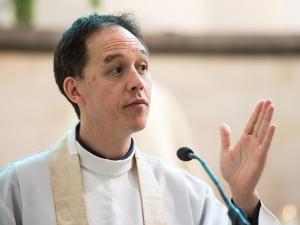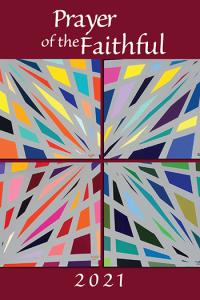Celebrations of Grace: The Sacraments of the Catholic Church, Part 15
Sometimes death is just the last gift a person gives us, the final chapter in the book of blessings that he or she is for us. It was that way for me in the deaths in the same year of both my parents—times of inspiration, family togetherness, and love. I didn’t want to think about gift when my brother and my niece died too soon of cancer, but the gift was there in the love of family and the courage to live and to die that each of them showed.
On those occasions, when we celebrated the sacrament of Anointing of the Sick, we were not celebrating death, sickness or suffering. We celebrated the blessings God sent us along with these unavoidable realities. Sometimes the blessings are impossible to see with human eyes. Celebrations are not always happy occasions. We even take extra special care to mark life’s tragic moments.
Non-Christians have trouble understanding why we try to find meaning everywhere. Why, my Japanese non-Christian friends want to know, do we say, “Good Friday”? Why do we “offer up” our suffering? Do we imagine that God actually wants it? Does God use our suffering to save the world? Is that what God was doing in the concentration camps of World War II or in the more recent horrors of “ethnic cleansing” and terrorist attacks? There are many ways that injustice causes innocents to suffer. And some great suffering occurs without any injustice. What does the sacrament of Anointing of the Sick say about these puzzles?
Anointing, a sacrament of healing
The Anointing of the Sick is a sacrament of healing (along with Reconciliation), and it tells us that all healing is a gift of God. God cares about our bodies as well as our souls. God cares about those who are suffering especially. In the sacrament of Anointing we celebrate healing.
Healing often comes with a lot of human effort. Some of the most important people in a community are the healers, the caregivers. We are a community of caring, sometimes to a heroic degree. As a Church we are deeply committed to the needs of all who are suffering. That commitment is another grace we celebrate in the Anointing of the Sick.
Finally, we celebrate the people in our community who are sick. Sometimes we don’t know how special they are until they become seriously ill. It is then that we often see courage, endurance, strength, even cheerfulness and many other qualities that we didn’t think about before and that now have become an inspiration for us. This is not just a sick person who needs our care. This is a member of our community and a blessing.
Changing the name
The Church instituted a major change in the celebration of this sacrament just by changing its name—from “Extreme Unction” to “Anointing of the Sick.” It is not meant to be a sacrament for extreme cases, when hope is gone. In fact this anointing is much more appropriate when death is not imminent. The occasion might be any serious illness, any physical, mental, emotional, or spiritual illness. It might be a difficult surgery coming up. It might be old age with its attendant physical problems and just the reminder of human mortality. The sacrament might be for a caregiver, coping with the change that comes as a result of the long-term illness of a spouse or friend.
The change in the purpose of Anointing of the Sick from preparation for death to celebration of healing made possible another big change. From the death bed or the hospital bed the sacrament often moves to the church. Many parishes now have regularly scheduled celebrations of this sacrament. They are not just saying to the sick person, “Since you’re well enough to get to church, the priest doesn’t have to go to you.” The meaning of this change is theological much more than practical. We invites the sick who can come and the elderly into the community’s place of worship because we value them. We want to see them, to know who they are. With them we celebrate and are blessed by their presence and their faith.
On the value of suffering
I asked a class of 5th graders if there is anything good about suffering. Some thought suffering makes us stronger. One student said, “Suffering helps us identify with Jesus.”
Evil does not belong in this world. Though we are not sure just what we mean by it, we believe that evil things happen because of sin. We are making a mistake, though, if we think of sickness, suffering, and death as punishments for sin. If we see truly, we will see what Jesus saw—people who are suffering and whom God loves. We will see many of God’s graces at work and we might see God’s healing. We will see our own obligation to be part of that healing work.
Throughout history God has made a “preferential option for the poor.” Christians, following their calling, must choose sides with the suffering and the poor. The presence of suffering and death in God’s world defeats all our attempts at explanation, but good can come of our response to it. God has many ways of making good come out of evil. It wasn’t suffering that saved us when Jesus died but things like obedience and living fully a human life.
It is Jesus’ strength, compassion, cheerfulness, patience, hope, courage, and fighting spirit—and the share of these that Jesus gives each of us—that we celebrate in the sacrament of the Anointing of the Sick. All of these things make our suffering an acceptable offering to God and a grace for the world. We identify with the suffering of Jesus and the tears of all people, we look forward to the blessed Kingdom of God, and join in bringing that Kingdom about by offering all our prayers, work, joy, and even suffering to God with Jesus.
Think again:
Being equal is not at all like being the same. Except in mathematics equality is not even measurable. How do you approach others as an equal? In what ways are sick and healthy people, strong and weak people, rich and poor people, suffering and satisfied people all blessings for each other? How have you been blessed by someone who was sick or dying?
Image credit: The Catholic Key via Google Images












